GALICIA CHIMALPOPOCA, FAUSTINO 1805 1877 (1 resultados)
Tipo de artículo
- Todo tipo de artículos
- Libros (1)
- Revistas y publicaciones
- Cómics
- Partituras
- Arte, grabados y pósters
- Fotografías
- Mapas
-
Manuscritos y
coleccionismo de papel
Condición
- Todo
- Nuevos
- Antiguos o usados
Encuadernación
- Todo
- Tapa dura
- Tapa blanda
Más atributos
- Primera edición
- Firmado
- Sobrecubierta
- Con imágenes del vendedor
- Sin impresión bajo demanda
Ubicación del vendedor
Valoración de los vendedores
-
Origen y Modo de Contar de los Indios
Publicado por Biblioteca Aportación Histórica, Mexico City, 1947
Librería: The Book Collector, Inc. ABAA, ILAB, Fort Worth, TX, Estados Unidos de America
Libro Original o primera edición
Soft cover. Condición: Very Good. 1st Edition. 33 pages. Octavo (8" x 6 1/4") issued in wrappers. Edited by Luis Vargas Rea. From the library of professor George M Foster. First edition limited to 100 copies of which this is number 55. Faustino Galicia Chimalpopoca or Faustino Chimalpopoca(tl) Galicia was born In 1805 in the present town of San Pedro Tláhuac. His mother's name is unknown, but Don Alejo Andrés Chimalpopoca Galicia was his father, who was one of the ruling families of the area and an official of the village and could trace his lineage to the precolonial rulers. As a member of one of these ruling families he enjoyed privileges that were not available to the farmers of the village. He attended school in the local village. His godfather was the local priest and he was able to get him into a Jesuit College in Mexico City, the Colegio de San Gregorio. There, he was admitted to prepare as a lawyer. After several years of study at this school received a law degree. After finishing his studies he was devoted to the teaching Nahuatl language classes and the transcription and translation of ancient documents unpublished from early colonial provenance. In the same St. Gregory College Faustino was given the chair of Nahuatl and became part of the Teachers Academy to study Mexican antiquities. In 1849 Chimalpopoca met Don Jose Fernando Ramirez, and under his direction, he worked as a copyist and translator until 1860. The outcome was a work is in two volumes. In 1856, he entered the Mexican Society of Geography and Statistics as an honorary member and later as a full number. He became in charge of research on indigenous languages, in particular was devoted to Nahuatl, his mother tongue, but he also knew Matlatzincatl and Ñahñú Otomi. In the society's newsletter, he regularly published this material. After his death much of his collection was sold off and is now scattered throughout university libraries and private collections. George McClelland Foster, Jr born in Sioux Falls, South Dakota, on October 9, 1913, died on May 18, 2006, at his home in the hills above the campus of the University of California, Berkeley, where he served as a professor from 1953 to his retirement in 1979, when he became professor emeritus. His contributions to anthropological theory and practice still challenge us; in more than 300 publications, his writings encompass a wide diversity of topics, including acculturation, long-term fieldwork, peasant economies, pottery making, public health, social structure, symbolic systems, technological change, theories of illness and wellness, humoral medicine in Latin America, and worldview. The quantity, quality, and long-term value of his scholarly work led to his election to the National Academy of Sciences in 1976. Virtually all of his major publications have been reprinted and/or translated. Provenance from the executor of Foster's library laid in. Condition: Foster's stamp on front wrapper. Pages age toned else a very good copy.


